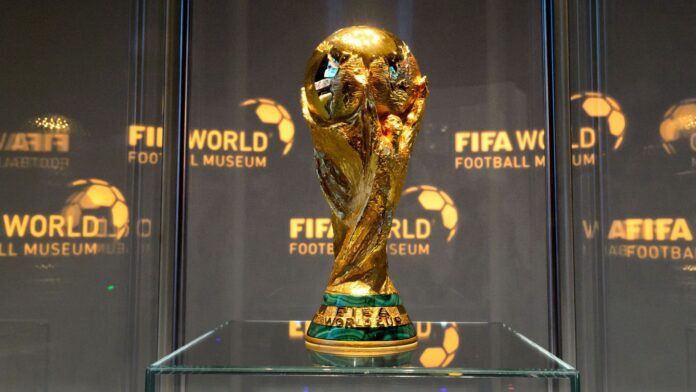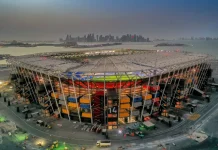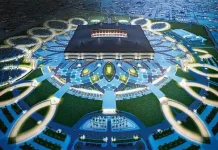In the first 21 editions, only eight nations had the ultimate bragging rights of being football champions.
Winning the World Cup not only gives prestige to their footballing pedigree but also gives them the bonus of putting a star on top of their badges after lifting the trophy, which was the culmination of a four-year cycle in which they put in the hard work.
Brazil
1958, 1962, 1970, 1994, 2002
The ever-present team in the World Cup has appeared in every staging and won the most titles with five, doing so on four continents.
It also has Pele, who stands alone as the winningest player in the tournament’s history, having a hand in the Selecao dynasty as he was part of their first three champion squads. Also in that squad was Mario Zagallo, who had won it twice as a player, and once as the manager.
They are, however, the only multiple-winning nation that has never won it at home, having suffered heartbreaks in 1950 and 2014.
Germany
1954, 1974, 1990, 2014
The Die Mannschaft, known for their ruthless efficiency, are always contenders in every tournament and will easily reach the knockout stages.
They have won three times as West Germany, including the first two as heavy underdogs. Their 2014 triumph was the first as a reunified nation and saw them inflict the most severe defeat to a host nation by taking down Brazil 7-1 in the semifinal before beating Argentina in extra time at the Maracana.
Franz Beckenbauer become just the second player (after Zagallo) to play and manage a World Cup-winning side, and the first as a captain (having done so in Munich)
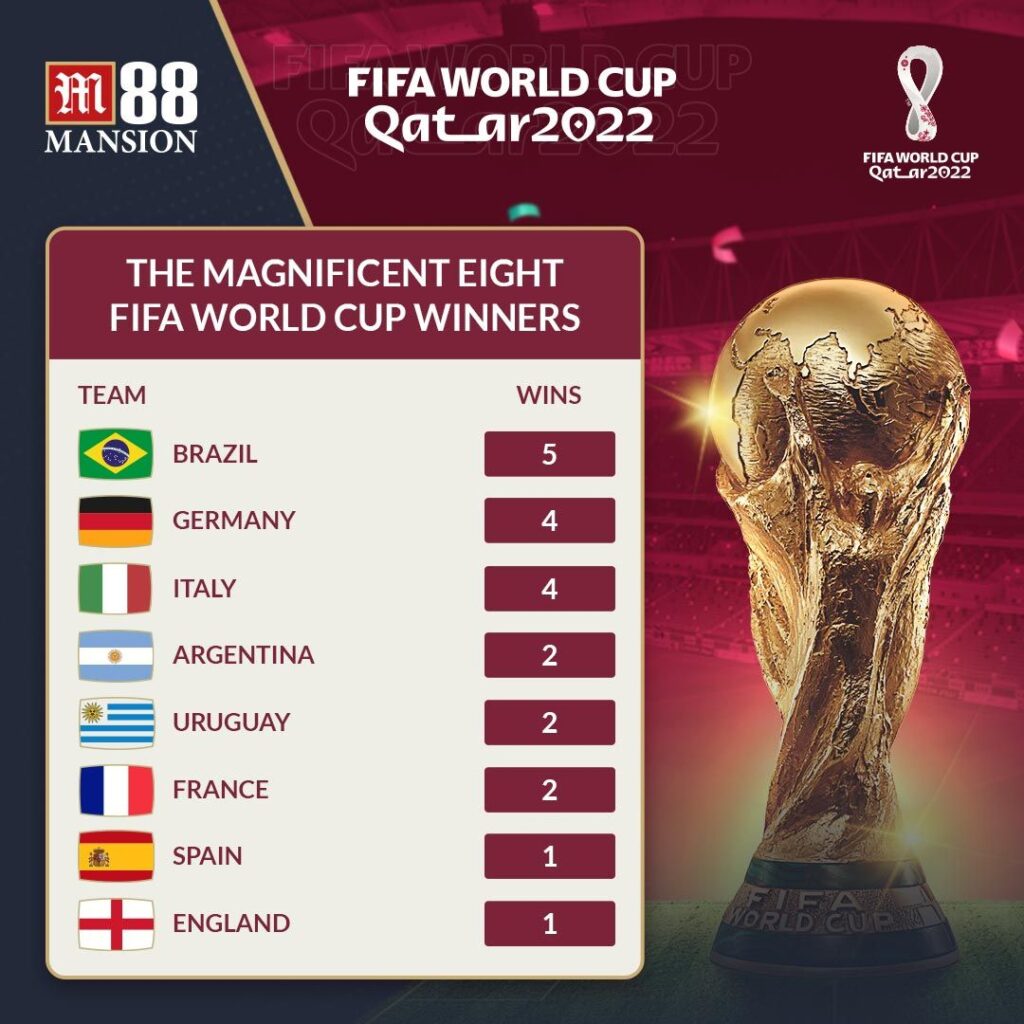
Italy
1934, 1938, 1982, 2006
The first nation to win two consecutive World Cups under the same manager (Vittorio Pozzo), the Azzuri waited 44 years for their third, thanks to Paolo Rossi’s goalscoring exploits in Spain.
After being the first losing finalist in a penalty shootout in Pasadena, it took them until 2006 to claim their fourth star after surviving a marathon finale over France via…you guessed it: penalties, as a form of retaliation for their quarterfinal exit in 1998.
Argentina
1978, 1986
Bridesmaids in the 1930 edition, it took them 48 years to get back in the final and finally win it, this time at home. Managed by Cesar Menotti, the Albiceleste were led by Mario Kempes’ six goals, including a brace in the final against the hard-luck Dutch.
Eight years later, Mexico saw the peak of Diego Maradona’s career. Already a polarizing figure for Carlos Bilardo’s side, the diminutive attacker became their leading man for their second world title, which included his magnificent performance against England in the quarterfinal.
France
1998, 2018
Fourteen years after Platini dazzled through to win the Euros on their turf, it was the generation of Aime Jacquet’s Les Bleus to win their maiden world title at home, having failed to qualify for the past two editions.
They’ve done so with a gritty display at the knockout stages: a golden goal against Paraguay, surviving a shootout from the spot against Italy, and a Lilian Thuram show against Croatia, before Zidane’s header brace saw them comfortably beat then-holders Brazil in the Finale.
After lifting the trophy as the captain in Saint-Denis, Didier Deschamps also guided the squad of Lloris, Griezmann, Pogba, and Mbappe to its second star in Moscow.
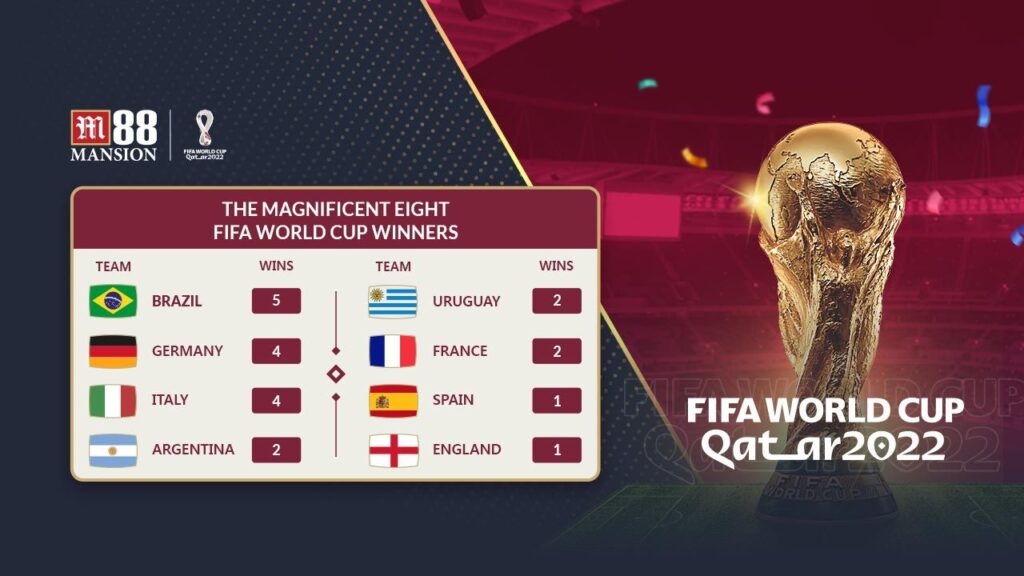
Uruguay
1930, 1950
The first-ever World Champions also have the youngest winning manager, with Alberto Suppici only being 31 when they won the inaugural tournament.
Also, they caused the first major upset to win it all 20 years later, as they pulled off the Maracanazo against the hosts en route to their second (and so far their most recent) world title.
With that, those two World Cups have added to their two Olympic golds, which is why they have four stars on their badge.
Spain
2010
Vicente del Bosque’s men have been the lone team to win it all despite losing their opening match and have become the first (and so far only) team to win the World Cup on African soil.
That happened in South Africa, with the momentum being the then-reigning European champions and known for its tiki-taka.
But a shock win by Switzerland threw off their plans, but they recovered in time to win Group H and went on a roll, capped off by an extra-time winner by Andres Iniesta in the final over the Netherlands in Soccer City.
England
1966
Managed by Sir Alf Ramsay, the Three Lions won their lone world title at their own Wembley stadium, having blitzed through the field after their opening draw with Uruguay.
Their finest hour came in the final against the West Germans, in which they took extra time. Geoff Hurst became the lone footballer to score a hat-trick in the final; with his last strike, commentator Kenneth Wolstenholme quoted his famous line. “They think it’s all over!”

